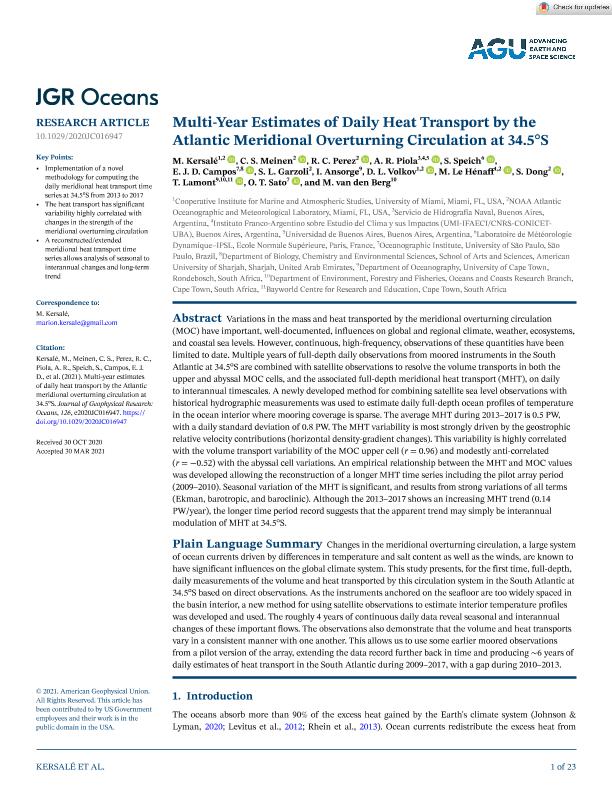Artículo
Multi-Year Estimates of Daily Heat Transport by the Atlantic Meridional Overturning Circulation at 34.5°S
Kersalé, M.; Meinen, Christopher S.; Perez, R. C.; Piola, Alberto Ricardo ; Speich, S.; Campos, E. J. D.; Garzoli, S. L.; Ansorge, I.; Volkov, D. L.; Le Hénaff, M.; Dong, S.; Lamont, T.; Sato, O. T.; van den Berg, M.
; Speich, S.; Campos, E. J. D.; Garzoli, S. L.; Ansorge, I.; Volkov, D. L.; Le Hénaff, M.; Dong, S.; Lamont, T.; Sato, O. T.; van den Berg, M.
 ; Speich, S.; Campos, E. J. D.; Garzoli, S. L.; Ansorge, I.; Volkov, D. L.; Le Hénaff, M.; Dong, S.; Lamont, T.; Sato, O. T.; van den Berg, M.
; Speich, S.; Campos, E. J. D.; Garzoli, S. L.; Ansorge, I.; Volkov, D. L.; Le Hénaff, M.; Dong, S.; Lamont, T.; Sato, O. T.; van den Berg, M.
Fecha de publicación:
04/2021
Editorial:
Blackwell Publishing
Revista:
Journal of Geophysical Research: Oceans
ISSN:
2169-9275
e-ISSN:
2169-9291
Idioma:
Inglés
Tipo de recurso:
Artículo publicado
Clasificación temática:
Resumen
Variations in the mass and heat transported by the meridional overturning circulation (MOC) have important, well-documented, influences on global and regional climate, weather, ecosystems, and coastal sea levels. However, continuous, high-frequency, observations of these quantities have been limited to date. Multiple years of full-depth daily observations from moored instruments in the South Atlantic at 34.5°S are combined with satellite observations to resolve the volume transports in both the upper and abyssal MOC cells, and the associated full-depth meridional heat transport (MHT), on daily to interannual timescales. A newly developed method for combining satellite sea level observations with historical hydrographic measurements was used to estimate daily full-depth ocean profiles of temperature in the ocean interior where mooring coverage is sparse. The average MHT during 2013–2017 is 0.5 PW, with a daily standard deviation of 0.8 PW. The MHT variability is most strongly driven by the geostrophic relative velocity contributions (horizontal density-gradient changes). This variability is highly correlated with the volume transport variability of the MOC upper cell (r = 0.96) and modestly anti-correlated (r = −0.52) with the abyssal cell variations. An empirical relationship between the MHT and MOC values was developed allowing the reconstruction of a longer MHT time series including the pilot array period (2009–2010). Seasonal variation of the MHT is significant, and results from strong variations of all terms (Ekman, barotropic, and baroclinic). Although the 2013–2017 shows an increasing MHT trend (0.14 PW/year), the longer time period record suggests that the apparent trend may simply be interannual modulation of MHT at 34.5°S.
Archivos asociados
Licencia
Identificadores
Colecciones
Articulos(SEDE CENTRAL)
Articulos de SEDE CENTRAL
Articulos de SEDE CENTRAL
Citación
Kersalé, M.; Meinen, Christopher S.; Perez, R. C.; Piola, Alberto Ricardo; Speich, S.; et al.; Multi-Year Estimates of Daily Heat Transport by the Atlantic Meridional Overturning Circulation at 34.5°S; Blackwell Publishing; Journal of Geophysical Research: Oceans; 126; 5; 4-2021; 1-23
Compartir
Altmétricas



